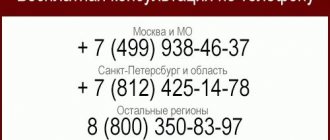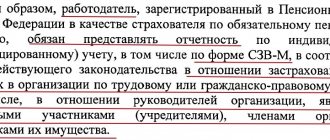Updated: January 1, 2021, at 14:11
There are often situations when the existence of a family is ensured by only one of its members. These could be women on maternity leave or single-parent families. In addition, grandparents or adult children may be the sole breadwinners. Therefore, if a job is lost, a family may be left without the means necessary to live. Let's look at whether the sole breadwinner can be fired or laid off if he alone supports his family. In what cases is this possible and when is it absolutely impossible?
Who is the sole breadwinner and his privileges
The concept of such status is not provided by any branch of law.
Only Article 179 of the Labor Code of the Russian Federation defines dependents. Based on this definition, we can define the sole breadwinner as a family member who financially supports those dependent on him.
Subjects whose special status has been confirmed acquire various advantages over other employees. Based on the provisions of Art. 264 of the Labor Code of the Russian Federation, such people cannot be involved in performing work tasks at night, overtime, on weekends and holidays. They may be provided with additional vacation days, favorable working conditions, etc.
But the main privilege of such citizens is the preferential opportunity to remain at work during staff reductions, since Art. 261 of the Labor Code of the Russian Federation establishes a ban on terminating labor relations with these people at the initiative of the company.
The list of eligible categories of persons includes:
– Mothers with a baby under 3 years old;
– Women or men (fathers of many children) who are the only parent of a child under 5 years old ;
– Adoptive parents or mother/father raising a young child under 14 years old/a young disabled person who has not reached the age of eighteen
– Single mothers, like fathers, cannot be fired (there are exceptions)
Incentives guaranteed by law for women-mothers, including reduction of working hours at night and weekends/holidays, working overtime, going on business trips, providing additional vacation days, drawing up a preferential schedule, etc., are also valid for fathers raising children alone and guardians .
Provisions of the Review of Legislation and Judicial Practice of the Armed Forces of the Russian Federation in the 1st quarter. 2010, define persons raising a child on their own as those employees who directly carry out the actual maintenance of children when their mother:
– Declared dead or deceased;
– The rights of a parent are limited or deprived;
– Recognized as missing;
– Incapacitated;
– Due to a serious health condition, she cannot perform maternal functions;
– Convicted and sent to prison and more.
Legislation gives men raising minors with their mother the opportunity to formalize:
- Parental leave until the child turns 3 years old;
- Additional vacation days without pay for up to 2 weeks at a convenient time. If they have more than 2 children under 14 years of age (disabled children under 18) .
One parent caring for a minor with a disability is given 4 days off per month. They can be used all at once or separately.
To confirm your position, you will need to provide your employer with:
· Certifying the birth of a child;
· When raising a disabled child, a statement of the diagnosis of the disease is provided;
· In the event of the loss of a mother, a certificate of her death;
· Documentation certifying family or other relationships with the child;
· When the second parent has no source of income, a certificate from the employment center, social security service or an extract from the work record book will be required.
Learn more about sole breadwinner status. Who are these people and how can I confirm my position?
If we are talking about the sole breadwinner , then it would be legally correct to consider him as a person who has a certain position in the sphere of labor relations. However, sanctions for sole breadwinners also work. In more detail, the sole breadwinner may be:
- single parent with two children (or more);
- single fathers and single mothers with a child under 3 years old;
- parents with a disabled child who has not reached the age of majority;
- single mothers with a child under 14 years old;
- as well as those persons who have adopted children or are guardians.
In what cases is it possible to dismiss a breadwinner?
Any employee, even the sole breadwinner, can be involved in the dismissal procedure:
- The company has been liquidated;
- The IP has ceased to exist.
An employee is subject to dismissal in the following cases:
1. Based on the results of the certification audit, it was revealed that he does not correspond to the position he occupies.
2. Failure to perform work functions without good reason.
3. Walking.
4. Appearing at work in a state of intoxication under the influence of alcohol or drugs.
5. Disclosure of information constituting trade secrets.
6. Failure to comply with labor safety standards.
7. Theft or intentional damage to the organization’s property, supported by evidence.
8. Loss of trust.
9. Committing illegal actions in the performance of official duties in raising children.
10. Forgery or falsification of documentation.
That is, dismissal can be carried out when the reason is provided for by the legislation of the country. And it is documented.
Guarantees for persons with family responsibilities
The Labor Code establishes a number of guarantees for persons with family responsibilities. Such persons include:
- women with children under the age of one and a half years;
- women with children under three years of age;
- mothers raising children under five years of age without a husband;
- fathers raising children under five years of age without a wife;
- persons raising children under 14 years of age (disabled children under 18 years of age) without a mother;
- single mothers raising children under 14 years of age (disabled children under 18 years of age);
- adoptive parents.
Guarantees and benefits for persons with family responsibilities are established by Art. 256-264 Labor Code of the Russian Federation, including:
— parental leave (Article 256);
- breaks for feeding the child (Article 258);
— guarantees when sent on business trips, involved in overtime work, night work, weekends and non-working holidays (Article 259);
— guarantees for termination of an employment contract at the initiative of the employer (Article 261);
— additional days off (Article 262);
— additional leave without pay (Article 263).
At the same time, guarantees and benefits provided by laws and other regulatory legal acts to women in connection with motherhood (limitation of night work and overtime work, work on weekends and non-working holidays, assignments on business trips, provision of additional leaves, establishment of preferential working conditions and etc.), apply to fathers raising children without a mother, as well as to guardians (trustees) of minors (Article 264 of the Labor Code of the Russian Federation).
According to the explanations presented in the Review of Legislation and Judicial Practice of the Armed Forces of the Russian Federation for the first quarter of 2010, persons raising a child without a mother are employees personally and directly involved in the actual upbringing of children if the child’s mother: died or was declared dead; deprived or limited in parental rights; recognized as missing, incompetent (partially incompetent); cannot raise a child due to health reasons; is serving a sentence in prison; and in other cases.
The Labor Code of the Russian Federation grants the right to fathers who are raising children with their mother to take parental leave until the child reaches the age of three, and to fathers who have two or more children under the age of 14 (a disabled child under 18) - additional unpaid leave of up to 14 calendar days at a time convenient for them, if this right is provided for by the collective agreement (Articles 256, 263 of the Labor Code of the Russian Federation). In addition, one of the parents, upon his written request, is provided with four additional paid days off per month to care for disabled children. These days can be used by one of these persons or divided among themselves at their discretion (Article 262 of the Labor Code of the Russian Federation).
As for guarantees upon dismissal, Art. 179 of the Labor Code of the Russian Federation grants a preferential right to remain at work in the event of a reduction in the number or staff of employees in the case of equal labor productivity or qualifications to family persons with two or more dependents (disabled family members who are fully supported by the employee or who receive assistance from him, which is for their permanent and main source of livelihood).
When you can't fire someone
The sole breadwinners are given the privileged right to remain at work when the number of employees of the enterprise or staff of the company is reduced, with relatively equal work efficiency or professional training.
This is especially true for single mothers or fathers or family unions with more than 2 dependents who are fully supported by a citizen or receive financial support, which is the main source of their existence.
To insure against such a case, you must confirm your position with documentation in advance.
In a situation where the wife has taken maternity leave at her place of work, from where she receives constant payments, her husband has no right to be considered the sole breadwinner of the family.
Of course, here it is possible for the husband to go on maternity leave to avoid dismissal. The husband has the right to formalize it, while the wife can start working. After a man returns back after maternity leave, it will not be possible to immediately break off the employment relationship with him, because this will require reasons.
Find out important things: Can a pregnant woman be fired - 3 exceptions
But you need to understand that there is a possibility of ruining your relationship with the company. You may even have to look for another job.
By the way, this method is also quite suitable at the end of the employment agreement, when there are no prospects for its extension. If an employee is on maternity leave, he cannot be fired, and the relationship will automatically extend for up to one year.
Considering that a woman will be considered in need of maintenance only when she is caring for children, the employer has the right to dismiss her husband legally. But if the employee has at least three dependent minors , and the other parent is not a party to the employment contract, then he cannot be fired; there is no reason for this.
If such a situation is allowed, it is necessary to appeal such actions to the relevant authorities.
In what cases will even the sole breadwinner be fired?
However, in some cases, the only breadwinner can be fired:
- Liquidation of a company. In this case, the employer is obliged to warn all employees at least 2 months in advance. In addition, employees are paid at least 1 severance pay in the amount of the average salary. If it was not possible to find a new job within a month, 2 benefits are awarded (maximum 3).
- Staff reduction - in this case, an employee may be fired, but he retains primarily the right to work while considering several candidates for dismissal at the same time.
- Systematic violation of labor duties , discipline, internal regulations, which can be expressed in lateness, incorrect filling out of documents, premature leaving of work, etc.
- A one-time gross violation - this could be appearing drunk, leaving work without permission, theft, deliberate damage to property, etc.
- Providing false documents during employment and/or to confirm the fact that the employee is the sole breadwinner.
- Inconsistency with the position. The certification commission must make a decision on this. At the same time, the company must offer other vacancies (including those with lower wages). If the employee refuses in writing, the employer can legally dismiss him.
- Gross violation of safety regulations, performance of work for which permission has not been granted.
- Disclosure of information constituting a commercial or state secret.
- Use of violence and commission of other crimes against children.
Filing a complaint to the labor inspectorate
Can be sent in various ways:
· Handed over to the service department with one’s own hand;
· Sent by postal services.
The claim must contain facts of violation of the employee’s rights, certified by evidence.
The application must be accompanied by documents confirming the illegality of the employer’s actions.
Read how to write a complaint to the labor inspectorate.
Will a father with many children, the only breadwinner in the family, be fired?
A large family in which the father is the sole breadwinner, since the mother of the children does not work due to the need to care for children, needs government support measures. In this regard, changes were recently made to the Labor Code of the Russian Federation to prevent the dismissal of a father with many children, the only breadwinner in the family. So, first things first.
Federal Law of November 12, 2012 No. 188-FZ “On Amendments to Article 261 of the Labor Code of the Russian Federation” amended the Labor Code of the Russian Federation.
A ban has been introduced on the dismissal of the sole breadwinner in the family at the initiative of the employer
There is now a ban on dismissal at the initiative of the employer of a parent (other legal representative of the child) who is the sole breadwinner of a disabled child under the age of 18 or the sole breadwinner of a child under the age of 3 in a family raising three or more young children. The main condition is that the other parent is not in an employment relationship.
Previously, the ban on dismissal at the initiative of the employer was established for the dismissal of mothers with a child under three years of age. The employer did not have the right to fire the child’s father only if he raised him without a mother.
The ban on dismissal does not apply to all cases.
The prohibition does not apply to cases of liquidation of an organization, termination of activities by an entrepreneur, or commission of guilty actions by an employee. Thus, an employer has the right to dismiss the sole breadwinner in a family in the following cases:
- repeated failure by an employee to perform labor duties without good reason, if he has a disciplinary sanction
- absenteeism
- appearing at work in a state of alcohol, drug or other toxic intoxication
- disclosure of secrets protected by law (state, commercial, official and other) that became known to an employee in connection with the performance of his job duties, including disclosure of personal data of another employee
- committing theft of someone else's property, embezzlement, intentional destruction or damage at the place of work, established by a court verdict that has entered into legal force
- the commission by an employee performing educational functions of an immoral offense incompatible with the continuation of this work
- the employee submits false documents to the employer when concluding an employment contract
- in other cases of the employee committing guilty actions









